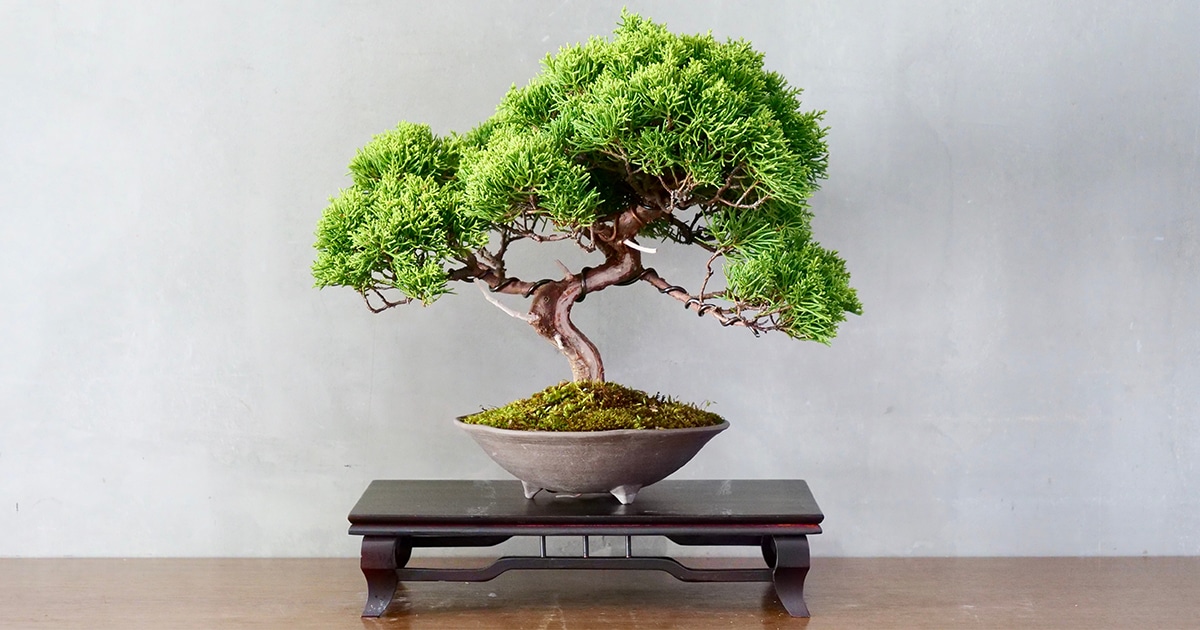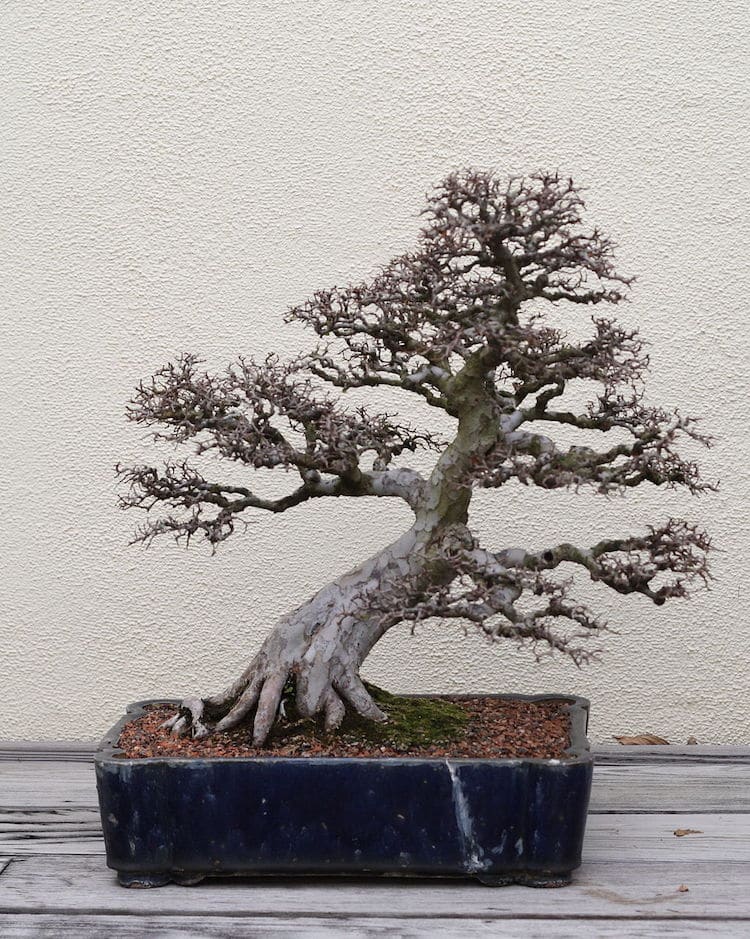The bonsai tree symbolizes harmony, balance, patience, and nature. It also represents the Zen Buddhist principles of simplicity and meditation.
Bonsai trees have captivated enthusiasts for centuries. These miniature trees embody the essence of nature’s beauty in a small, manageable form. Originating from ancient China and Japan, bonsai cultivation is an art form that requires patience and meticulous care. Each tree tells a unique story, reflecting the grower’s dedication and artistry.
Bonsai trees are often seen as symbols of peace and tranquility, making them popular in homes and offices. Their aesthetic appeal, coupled with deep symbolic meanings, makes bonsai trees a fascinating subject for both horticulturists and casual admirers. Whether you’re an expert or a beginner, bonsai trees offer endless opportunities for learning and growth.

Credit: bonsai2u.co.uk
Introduction To Bonsai Trees
Bonsai trees are miniature trees grown in containers. They captivate with their beauty. These tiny trees are more than just plants. They symbolize art, patience, and care.
Brief History
The art of Bonsai began over a thousand years ago. It started in China and was known as “Penjing”. In the 6th century, Buddhist monks brought the practice to Japan. The Japanese refined and popularized it. Today, Bonsai is practiced worldwide. It’s a blend of horticulture and art.
Cultural Significance
Bonsai trees carry deep meanings in different cultures. In Japan, they represent harmony, peace, and balance. They are seen as a way to connect with nature. In China, they symbolize the harmony between man and nature.
Many people grow Bonsai to find inner peace. It’s a meditative practice that requires patience. Each tree tells a unique story. The shape, size, and age of a Bonsai have symbolic meanings. For example:
- Small leaves symbolize precision and attention to detail.
- Twisted trunks represent resilience and strength.
- Old trees signify wisdom and longevity.
Bonsai trees are often gifted to convey respect and good fortune. They make perfect gifts for special occasions. Their presence in homes and offices brings calmness and beauty.
Symbolism In Different Cultures
The bonsai tree holds deep meaning in various cultures. Each culture has unique interpretations and symbolism. Understanding these can deepen our appreciation for these miniature trees.
Japanese Traditions
In Japan, the bonsai tree symbolizes harmony and balance. These trees reflect nature’s beauty in a small form. They represent a connection between nature and human life.
The art of bonsai has been practiced in Japan for centuries. It is seen as a way to achieve inner peace. The Japanese believe that caring for a bonsai tree teaches patience and dedication.
Japanese culture also sees bonsai as a symbol of simplicity. The minimalist design of bonsai trees aligns with Zen Buddhist teachings. These teachings emphasize mindfulness and living in the present moment.
Chinese Beliefs
In China, the bonsai tree is known as Penjing. It dates back thousands of years. In Chinese culture, Penjing represents the harmony between heaven and earth.
Chinese people believe that bonsai trees bring good luck and fortune. They often place bonsai trees in homes and offices. This is to attract positive energy and ward off evil spirits.
There are different styles of bonsai in China. Each style has its own meaning. For example, the upright style symbolizes strength. The cascading style represents resilience and grace.
| Cultural Aspect | Symbolism |
|---|---|
| Japanese | Harmony, Balance, Inner Peace, Simplicity |
| Chinese | Harmony, Good Luck, Fortune, Positive Energy |
In both cultures, the bonsai tree holds significant meaning. It transcends being just a plant. It becomes a symbol of deeper values and beliefs.
Bonsai And Zen Philosophy
The bonsai tree is more than a miniature plant. It represents deep cultural and philosophical values. One of the most profound connections is with Zen philosophy. This ancient practice emphasizes simplicity, mindfulness, and harmony. Let’s explore how bonsai trees embody these principles.
Mindfulness Practice
Caring for a bonsai tree requires careful attention. Each pruning and watering session is a chance to practice mindfulness. You focus on the present moment. This helps you cultivate a calm and peaceful mind. You cannot rush the growth of a bonsai. Patience and consistency are key. This mirrors the principles of Zen, where every action is deliberate and thoughtful.
- Pruning: Trim the tree to maintain its shape.
- Watering: Ensure the tree gets the right amount of water.
- Observation: Regularly check the tree’s health and needs.
These tasks require you to be present and attentive. This fosters a deeper connection with the tree and with yourself.
Harmony With Nature
A bonsai tree represents harmony with nature. It captures the essence of a full-sized tree in a small pot. This reflects the Zen principle of finding beauty in simplicity and imperfection. By growing a bonsai, you learn to appreciate the natural world. You understand the delicate balance of life.
This practice also teaches respect for living things. You must work with the tree’s natural growth patterns. This encourages a sense of humility and reverence. You realize that you are not controlling the tree. Instead, you are guiding it to express its natural beauty.
| Zen Principle | Bonsai Practice |
|---|---|
| Mindfulness | Careful pruning and watering |
| Harmony | Respecting the tree’s natural growth |
| Simplicity | Finding beauty in small details |
In this way, bonsai trees serve as a living expression of Zen philosophy. They remind us to live mindfully and harmoniously with nature.

Credit: mymodernmet.com
The Art Of Patience
The Bonsai tree is a symbol of peace, balance, and simplicity. One of its most profound representations is the art of patience. Growing a Bonsai tree is a journey that requires dedication, time, and care. Understanding this process can teach us valuable life lessons.
Cultivation Process
Cultivating a Bonsai tree starts with choosing the right species. Some popular choices include Juniper, Pine, and Maple. Each type has unique needs and growth patterns.
The next step is to plant the seed in suitable soil. Ensure the soil provides good drainage and nutrients. Water the seed regularly but avoid overwatering.
Pruning is essential in shaping the Bonsai tree. Use sharp, clean tools to trim branches and leaves. Prune regularly to maintain the desired shape.
Long-term Commitment
Growing a Bonsai tree is not a quick task. It can take years for a Bonsai to mature. This long-term commitment teaches patience and perseverance.
Regular care is needed to keep the tree healthy. Watering, pruning, and repotting are ongoing tasks. Each action contributes to the tree’s growth and beauty.
Many Bonsai enthusiasts pass their trees down through generations. This tradition emphasizes the importance of commitment and care over time.
Here’s a quick overview of the Bonsai care process:
- Choose the right species
- Plant in suitable soil
- Water regularly
- Prune and shape
- Repot when necessary
The Bonsai tree teaches us to appreciate slow, steady progress. It embodies the essence of patience and dedication.
Bonsai As A Spiritual Metaphor
The bonsai tree is more than a decorative plant. It carries deep spiritual meanings. These miniature trees symbolize patience, care, and dedication. They also reflect the human journey of growth and inner peace.
Growth And Transformation
A bonsai tree demonstrates growth and transformation. Each tree starts as a small seed. With time, it transforms into a beautiful masterpiece. This process mirrors our own lives. We start small and grow with experiences.
Just like a bonsai, we undergo many changes. These changes shape us into who we are. The tree’s transformation teaches us to embrace growth. It shows that even small steps lead to great transformations.
Inner Peace
Caring for a bonsai promotes inner peace. The process requires patience and attention. These elements help calm the mind. The act of pruning and watering is meditative. It allows for moments of reflection and tranquility.
Watching a bonsai grow also brings joy. It connects us with nature and our inner selves. This connection fosters a sense of peace and contentment.
| Symbolism | Meaning |
|---|---|
| Growth | Personal development and change |
| Inner Peace | Calmness and mindfulness |
The bonsai tree is a powerful spiritual metaphor. It teaches us about growth and inner peace. These lessons are valuable for our personal journeys.
Modern Interpretations
In the modern world, bonsai trees have new meanings. These tiny trees still symbolize patience and care. Yet, they now carry extra layers of significance. People use bonsai trees in various contemporary contexts.
Contemporary Symbolism
Bonsai trees represent harmony with nature. They also symbolize balance in life. Many view bonsai trees as symbols of inner peace. They remind us to slow down and reflect. These small trees encourage mindfulness in daily life.
Another modern meaning is sustainability. Bonsai trees show a commitment to the environment. They are often seen as a nod to eco-friendly living. This connection makes bonsai trees popular among green enthusiasts.
Bonsai In Popular Culture
Bonsai trees appear in movies and TV shows. They often symbolize wisdom or tranquility. For example, in “The Karate Kid,” Mr. Miyagi uses bonsai trees to teach patience.
They also make appearances in art and literature. Many artists use bonsai trees in their work. These trees often symbolize growth and perseverance.
Bonsai trees are also popular in home decor. They add a touch of elegance and nature to any space. Many people use them to create a calming atmosphere in their homes.
Caring For A Bonsai
Caring for a bonsai tree involves dedication and patience. These miniature trees represent balance and harmony. Proper care helps maintain their beauty and health. Let’s explore some essential tips.
Basic Care Tips
- Watering: Bonsai trees need regular watering. Ensure soil remains moist but not waterlogged.
- Lighting: Place your bonsai where it gets ample sunlight. Avoid direct, harsh rays.
- Pruning: Regular pruning keeps the tree’s shape. Remove dead branches and leaves.
- Soil: Use well-draining soil. This prevents root rot and ensures healthy growth.
- Fertilizing: Feed your bonsai with a balanced fertilizer. Follow the package instructions carefully.
Common Mistakes
- Overwatering: Too much water can cause root rot. Always check soil moisture first.
- Insufficient Light: Lack of light weakens the tree. Ensure it gets enough indirect sunlight.
- Neglecting Pruning: Skipping pruning leads to overgrowth. Regularly trim to maintain shape.
- Poor Soil Choice: Using heavy soil can suffocate roots. Choose a light, well-draining mix.
- Ignoring Pests: Pests can damage your bonsai. Inspect regularly and treat any infestations.

Credit: mymodernmet.com
Conclusion
Bonsai trees symbolize balance, harmony, and inner peace. They remind us to appreciate nature’s beauty and simplicity. Cultivating a bonsai fosters patience and mindfulness. This ancient art form encourages personal growth and reflection. Embrace the bonsai’s teachings and bring tranquility into your life.

